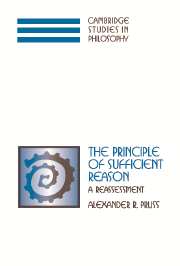Book contents
- Frontmatter
- Contents
- Acknowledgments
- Part I The Principle of Sufficient Reason and the Causal Principle
- Part II Objections to the PSR
- Part III Justifications of the PSR
- 11 Self-Evidence
- 12 Three Thomistic Arguments
- 13 Modal Arguments
- 14 Is the Universe Reasonable?
- 15 Explanation of Negative States of Affairs
- 16 The Puzzle of the Everyday Applicability of the PSR
- 17 Inference to the Best or Only Explanation
- 18 Inductive Skepticism
- 19 The Nature of Possibility
- 20 Conclusions
- Bibliography
- Index
12 - Three Thomistic Arguments
Published online by Cambridge University Press: 27 July 2009
- Frontmatter
- Contents
- Acknowledgments
- Part I The Principle of Sufficient Reason and the Causal Principle
- Part II Objections to the PSR
- Part III Justifications of the PSR
- 11 Self-Evidence
- 12 Three Thomistic Arguments
- 13 Modal Arguments
- 14 Is the Universe Reasonable?
- 15 Explanation of Negative States of Affairs
- 16 The Puzzle of the Everyday Applicability of the PSR
- 17 Inference to the Best or Only Explanation
- 18 Inductive Skepticism
- 19 The Nature of Possibility
- 20 Conclusions
- Bibliography
- Index
Summary
Recall St. Thomas's distinction between existence, esse, and essence, essentia or quidditas. Thomas took it as obvious that every thing needed something by virtue of which it had being, and took this needed “something” to be a causal relation in the case of contingent things. Is there an argument on Thomistic principles for this intuition of his? I will argue that there is. Indeed, I will discuss three arguments, of which at least the second works, and there is something to be said for the third. While the first argument is, I believe, unsound, together the first two arguments can be seen as handling two horns of a dilemma, depending on which way the esse-essentia distinction is taken.
FIRST THOMISTIC ARGUMENT: THE REGRESS OF EXISTENCES
The Regress of Existences
Consider a puzzle about a given existing thing, say Socrates, on Thomistic principles. Socrates has an essence and an act of existing. When we say that Socrates exists, we are talking about his act, A1, of existing – this act of existing is the truthmaker for the claim that Socrates exists. At the same time, the act of existing is itself something that exists – if it did not, it could not ground Socrates' existing. Socrates' act of existing is not a necessary being, since then Socrates would be a necessary being. Thus, A1 itself contingently exists. What is it in virtue of which A1 itself exists?
- Type
- Chapter
- Information
- The Principle of Sufficient ReasonA Reassessment, pp. 209 - 230Publisher: Cambridge University PressPrint publication year: 2006



